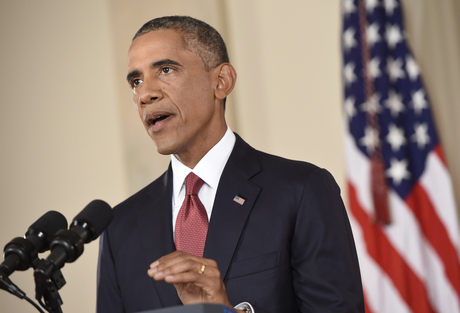Republicans: Obama Ignores Iran Expansion to Get Deal

Republicans hammering the Obama administration about nuclear talks with Iran have stepped up their criticism on a second front: accusing President Barack Obama of being so keen to strike a deal that he's ignored Iranian moves to expand its influence across the Middle East.
Republican Party hawks maintain that Obama wants so much to burnish his legacy with an agreement to restrain Iran from becoming a nuclear-armed state that he is not pushing back against Iranian activities in Iraq, Yemen, Syria, Lebanon and Bahrain. Secretary of State John Kerry has defended the administration repeatedly against a barrage of questions from lawmakers, including some who insist that the nuclear negotiations have hamstrung U.S. policy decisions in the region.
"Yes, Iran's influence has spread at this moment and we are deeply concerned about it," Kerry told lawmakers at one hearing. "But if you're concerned about it now, think of what happens ... if they had a nuclear weapon."
Republicans point to the activities of Iran, the dominant Shiite force in the Middle East, in these countries:
—IRAQ. Iran-backed militias are fighting alongside Iraqi forces to retake Tikrit, a Sunni stronghold seized by Islamic State militants. Army Gen. Martin Dempsey, chairman of the Joint Chiefs of Staff, says the U.S. worries that the militiamen, who are Shiite, might eventually turn against Sunni and Kurdish Iraqis, further destabilizing a country whose future depends on less infighting among the factions.
—YEMEN. The administration had touted Yemen as a success in the fight against terror, but Houthi rebels, backed by Iran, seized the capital from a U.S.-backed leader who supported American drone strikes against suspected al-Qaida figures there. Nick Rasmussen, who directs the National Counter Terrorism Center, recently told a Senate intelligence panel that Yemen's American-funded army failed to oppose advancing Houthi rebels, and that the collapse of the government surprised the Obama administration.
—SYRIA. Iran supports Syrian President Bashar Assad, who has waged an unrelenting campaign of bloodshed and starvation against his own people for years and is fighting against moderates trying to topple him. On the military front, Tehran has provided advisers and billions of dollars in aid and has roped in Shiite militias from across the region, particularly Lebanon's Hizbullah but also fighters from Iraq, to reinforce the government's beleaguered troops.
—LEBANON. Iran's link to Lebanon is through its decades-long support for Hizbullah, Lebanon's Shiite militant group.
—BAHRAIN. Bahrain, which hosts the U.S. Navy's 5th Fleet, is led by a Sunni monarchy that has struggled to quell Shiite protests demanding greater rights and equal treatment. Leaders in Bahrain claim Iran is helping Shia militia; Iranian leaders accuse leaders in Bahrain's capital of Sanaa of supporting anti-Iranian forces there.
"The Iranians are now in Sanaa. They're in Baghdad and Beirut and Damascus and meanwhile this president and secretary of state pursue the mirage of a nuclear agreement," Republican Sen. John McCain, chairman of the Armed Services Committee, said in a recent speech.
Banging the podium, McCain lamented how the Iranian-backed Shite militias are fighting the Islamic State group in Tikrit, the Sunni stronghold and hometown of former Iraqi leader Saddam Hussein. Directing the offensive is Iranian Gen. Ghasem Soleimani, commander of the powerful Revolutionary Guard's Quds Force. The overt Iranian role and the prominence of Shiite militias in the campaign have raised fears of possible sectarian cleansing should Tikrit fall.
"Soleimani is the same guy that sent copper-tipped IEDs (improvised explosive devices) into Iraq, which killed hundreds of American soldiers and Marines," McCain said. "That is not only unbelievable. It is totally unacceptable."
Among the Democrats countering the Republican refrain, Sen. Tim Kaine says he shares the concern about Iran's involvement but "this is not about turning Iran from an enemy into a friend. This is whether an enemy has a nuclear weapon or doesn't. The administration is very realistic. If there is a good nuclear deal, we still have to confront the adventurism of Iran beyond its borders."



